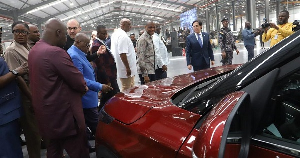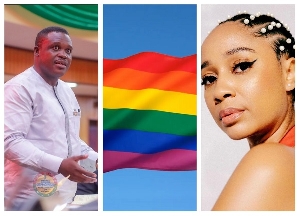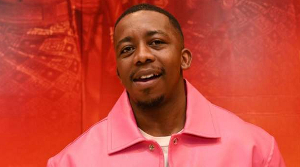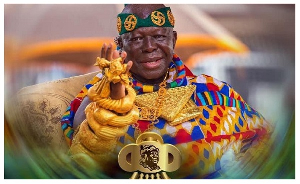- Home - News
- TWI News | TV
- Polls
- Year In Review
- News Archive
- Crime & Punishment
- Politics
- Regional
- Editorial
- Health
- Ghanaians Abroad
- Tabloid
- Africa
- Religion
- Election 2020
- Coronavirus
- News Videos | TV
- Photo Archives
- News Headlines
- Press Release
Diasporia News of Monday, 9 February 2004
Source: ghana high commission, canada.
Presidential Biographies and Democracy in Ghana
[The Africa World Press in Princeton, New Jersey, supported by The High Commission in Canada and some Ghanaian organizations launched Between Faith and History-A Biography of J.A. Kufuor which was addressed by His Excellency Samuel Odoi-Sykes and Mr. Jeffrey D. Steiner, President of the Toronto Economic Development Corporation in Toronto on January 31, 2004. We present remarks by the author of the book, Mr. Ivor Agyeman-Duah.]
Leadership is about all that moves the world. The splendor of North America, which has attracted many of our compatriots to this country, had a basis in good leadership. The America dream, which has transformed the United States into a global power and the only super power, had a genesis in visionary leadership that began over 280 years ago. I am talking of a country whose spending power is such that the production cost of an entertainment film like the Titanic would have been enough to wipe the billions of dollars that the United Nations needed to transform the world into a wealthier and peaceful place some years ago. I am talking of a country where an oil company like Exxon Mobil makes over $25b profit in a year, an amount that is equal to the gross domestic product of at least five African countries; a country where a multi-national company like General Electric has the equity and grows wealth and influence such that the only thing that prevents it from being a state is sovereignty and people.
A conductive atmosphere is thus created for capital growth and wealth creation by their leadership. On the other side of our divide, the situation as it existed under Sani Abacha of Nigeria for instance where an individual leader ill-accumulated over $100b of the people’s money and de-capitalized the enterprineual class for poverty to spread all around.
The question of why Africa, one of the richest continents in the world is still poor and making the backwaters of wealthy nations is rooted in leadership. The trouble with Africa to quote one of Nigeria’s distinguished novelists, Chinue Achebe, in a different context, is a problem with leadership.
One of the reasons why it is so is because Africa, with a population of over 750 million people has since the post-independent era of 40 years, had little say in who governed them. On the average, 25 years of this were by military usurpation of governance wasting generations of growth and development. These were the unknown quantities, the untested rulers of the post-independent state. It is always unproductive for business corporations and work places if there is leadership imposition with untested intensions. For nations, it is worst because it has a macro-canvass.
One of the fortunes of Ghana was that in 1998, the people decided by a referendum that they wanted to have a say in who their leaders would be; when to choose them and when to sack them. This is what brought us again to constitutional rule after almost two decades of military and experimental life. It is the greatest possession we have ever had since March 6, 1957. But the question still remains: have we as a people known our leaders? - Even the self-imposed ones? The answer is NO.
Kwame Nkrumah was also known for his prolific scholarship and writings. Before independence, he published his Ghana: Autobiography of Kwame Nkrumah. You may have reservations about the book but one thing he did was to tell us who he was and where he was coming from, his intentions to lead the Gold Coast to Ghana and his vision for Ghana and Africa. This was later followed by a multiplicity of biographies from all geographical areas around the world. Perhaps, the literary filament and protest will of the era which saw Zambia Shall by Free by Kenneth Kaunda, Not Yet Uhuru by Jomo Kenyatta, was suggested of the new hope that de-colonization brought and the emergence of an African ruling elite. Since Nkrumah, we haven’t had autobiographical accounts of our other leaders. At best, we have had ideological expositions from K.A. Busia in Democracy in Africa among others. It took even too long (25 years after his death) for his biography, Political Biography of Dr. Kofi Abrefa Busia by Kwaku Boafo Danso to come out last year.
But we have had a lot of military accounts of justification of coups and semi-biographical reportage from Akwasi Afrifa’s No More Coups to Jerry John Rawlings’, The Trial of J.J. Rawlings by Kojo Yankah.
Even if the culture of memoir writing has not improved with our leaders since the 1970s, because the leaders were busy or did bad things for which they were afraid or embarrass to make permanent in writing, it is upon the citizenry especially, its community of writers to let people know who their leaders were and are.
We are fortunate in Ghana now because there is abundance of freedom to write and research into our 12 years of constitutional renaissance. The earlier we know who the leaders are before office, the better. In that sense we can know where they are coming from and be able to assess them better.
One of the important factors about democracies in Britain and the United States is the culture of biographies. Immediately after Tony Blair emerged as Leader of Her Majesty’s Opposition, that is, New Labor, at least I read two biographies on him as a student in the United Kingdom. Millions of the biographies were sold on he who could possibly be their leader. Yet, Blair was only an opposition leader without the likelihood at that time that he could become Prime Minister after John Major. About two months ago, another biography on him and George Bush titled Allies came out. Two others followed: Thirty Days-Tony Blair and the Test of History by Peter Stothard and Tony Blair by Philips Stephens.
President Bush is in his 4th year in office with 15 biographies. After The Right Man by David Frum, his former speech writer in 2003, we have, American Dynasty by Kelvin Phillip, The Bush’s Brain by James Moore and Wayne Slater, Fraud-The Strategy Behind The Bush Lies and Why The Media Didn’t Tell You by Paul Waldman. Three weeks ago we had, The George W. Bush Presidency-An Early Assessment by Fred I. Greenstein, Warrior-King-The Case for Impeaching Bush by John Bonifax, Bush in Babylon-The Recolonisation of Iraq by Tariq Ali, Imperial America-The Bush Assault on the World Order by John Newhouse and as currently as George Soros latest book The Bubble of American Supremacy which is an assessment of Bush’s Foreign Policy in especially Iraqi after the invasion. Of the five Democratic Candidates for the December elections in the United States, at least all of them have an autobiography or a biography published before the conclusion of the primaries. Howard Dean has A Citizen’s Guide to The Man Who Would Be President and two autobiographies Howard Dean in His Own Words and Winning Back America. John Kerry has A Call to Service and a biography Tour of Duty, John Kerry and The Vietamin War by Douglass Brinkley. General Wesley K. Clark has Waging Modern War and John Edwards Four Trials. Why is this a common practice? People are interested in what their leaders are doing now or can do for them today then the verdict of history. They want to correct them now or vote against them today and look for better results then an interpretation of their past actions by innocent future writers and historians. If an assessment of leaders out of office and power is the ideal form of biographical exercise, its imperative equivalent is for people to know their leader in the first place Britain like the United States and Canada have centuries of tested democratic cultures that are stronger then individual leaders and their talents. The democratic culture only prepares the elected leaders to flourish. If even the advanced democracies perpetuate their security by reading and knowing who their leaders could be and are, then it is imperative for Ghana and infant democracies to ensure that presidential biographies are as important as putting a vote in a ballot box because that seeming act of democratic dispensation could be meaningless if you do not know the person you are voting for or what his capacity is.
It is as important as the past leaders writing their memoirs not only as a guide for current leadership but to prevent repetition of mistakes. Unfortunately, Ghana has only one former President, John Jerry Rawlings. It will only be an act of grace and blessing for us if he writes his autobiography sooner then later.
These were some of the challenges behind Between Faith and History-A Biography of J.A. Kufuor.
From 1990 when I completed my journalism studies, I worked as a political reporter for The Pioneer newspaper in Kumasi and later The Independent. I also reported for the international media including Panos Institute and New African in London. I got to know the opposition class to the Rawlings regime and some like the late President Hilla Limann, Prof. Albert Adu Boahen, Rev.Dr. Samuel Asante Antwi, the late Obeng Manu and of course John Agyekum Kufuor became friends. Especially with Kufuor, I had access not only to him but other family members in the writing of this book, which was last year published by the Centre for Intellectual Renewal, which I founded in Ghana 5 years ago as a public policy center. In the last quarter of last year, Africa World Press in Princeton, New Jersey, expressed the interest to do an American edition, which we are launching today.
The book ends at the time President Kufuor was elected in December 2000. I deliberately ended it there. The second edition of the book, which will come out of Africa World Press, will cover his presidency in addition to this one. That edition will include policy analysis and an examination of whether the Government was able to fulfill some of its promises.
:










